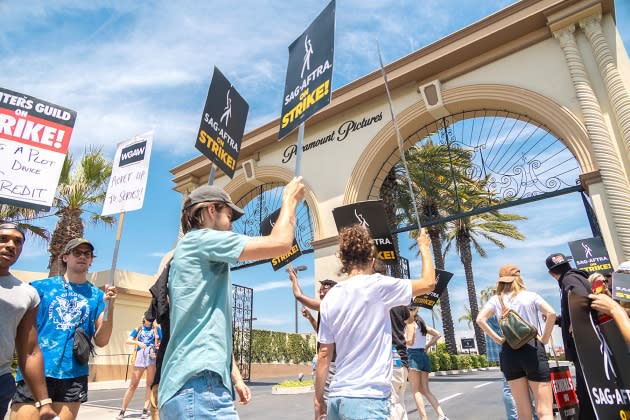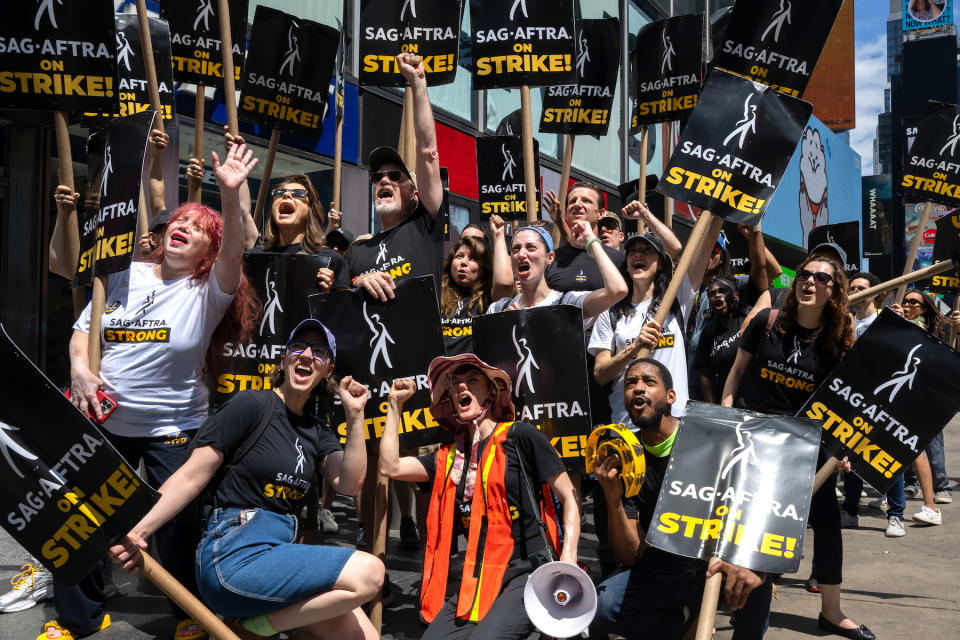Actors’ Strike: Marvel Actress Received a Residual Check for 14 Cents

Members of the Screen Actors Guild – American Federation of Television and Radio Artists (SAG-AFTRA) and Writers Guild of America (WGA) picketed outside of Paramount Studios in Los Angeles on Friday, lining the sidewalks and chanting, “Whose stories? Our stories,” in solidarity with each other. Despite the summer heat, a sizable number of actors and writers turned up to show support for one another and to express their frustrations with Hollywood studios and streamers that failed to make equitable deals for new contracts with their separate unions. Lady Gaga songs like “The Edge of Glory” and “Poker Face” played on a loop outside of Paramount’s gates as dozens and dozens of people carried signs that read, “I would like a support yacht one day,” and “I’m Netflix Barbie: Poor,” and, “AI doesn’t have childhood trauma.”
Some actors who spoke to Rolling Stone expressed their concerns about pay, residuals, and the general state of the industry, but the resounding topic on everyone’s mind was artificial intelligence. Bri Collins, who most notably appeared in Amazon’s The Underground Railroad as a character named Olivia, said that she showed up to strike at Paramount because she feels that AI “is going to be a huge downfall in our industry.”
More from Rolling Stone
How 'Boy Meets World' Star Maitland Ward Found Her Sexuality in Porn
The 'Barbie' and 'Oppenheimer' Double Feature Left Me Questioning Reality Itself
Hollywood's Fight Against AI Puts Background Actors in the Spotlight
“It’s just so crazy how they can use our likeness,” Collins said.
Before acting in Amazon’s TV miniseries The Underground Railroad, which was created by Barry Jenkins and nominated for seven Emmy awards, Collins said she got her start in Hollywood as a background actor. While artificial intelligence is a pressing matter for all actors, Collins said, it’s especially important for background actors who already get paid so little but depend on their gigs for paychecks and to advance their careers in the industry.
“I started off as a background extra many, many years ago and it’s very important for them to get paid for what they’re actually doing,” she said. “Just knowing these producers want to take their scans and use it for eternity without their consent, giving them fair compensation for it, or without them having any proper knowledge, I think that is disgusting.”

Voice actor Nicole Vigil said she showed up on Friday because she’s frustrated that studios haven’t “stepped into the 21st century and caught up with technology, including AI.” Vigil has voiced characters for years in video games like Harry Potter: Magic Awakened, The Walking Dead: The Telltale Definitive Series, and Assassin’s Creed II: Discovery. Given her role in the entertainment industry, Vigil thinks it’s especially important to implement guidelines when it comes to using AI.
“AI is kind of the Wild West right now. It’s been in development for many years but it seems to have kind of hit warp speed within the last year, particularly within the last six months, and it seems that legislators are always behind the eight ball when it comes to putting in guard rails for anything, really, which is why we need the union more than ever to be the leaders in this fight,” Vigil explained.
“We don’t want to get rid of AI, that’s a misconception a lot of people have with people that are striking,” she added. “AI can be a great thing, it can be an incredibly helpful thing, but it can also be an incredibly dangerous thing, so we need some guardrails so people can continue to make a living.”
Brian Lee, a 30-year-old actor, said he agrees that AI needs to be regulated because actors already make such lowl wages compared to the CEOs and studio executives who will ultimately benefit from artificial intelligence.
“It’s really sad that you have CEOs making millions and millions of dollars and they don’t want to give us just a small percentage of it, and that’ll be even worse if we don’t regulate AI,” he maintained.
The worst case scenario, according to Lee, is his entire profession and career trajectory “could just vanish out of nowhere” if studios and streamers are allowed to use artificial intelligence as a means of obtaining actors’ and entertainers’ likeness in perpetuity.
“Someday you think that you’re working and then all of a sudden — bam! — your job is gone and your livelihood is gone,” Lee said. “It’s already a struggle enough through the years to get steady work, let alone to have to deal with robots possibly taking over the world and all these other things. We have to come together and come to a mutual understanding.”

Aspiring actors who aren’t yet guild members were also present at the strike on Friday in solidarity with SAG-AFTRA. They don’t have to be members of the union for these same issues to be concerning, they told Rolling Stone. Anna Manheimer, a 35-year-old Los Angeles resident, echoed other actors’ sentiments about artificial intelligence.
“I don’t believe AI can write or act. It’s soulless,” Manheimer said. “It doesn’t have real-life experience. Sure, it can learn 100 years of movie industry history and performances but it’s not going to create anything touching, personal, or unique, and those are the things that catch our attention when we watch TV shows, movies, or any other projects.”
Keira Weiss, a 19-year-old student and aspiring actor, agreed. Weiss said she was excited to finally show up to strike in-person and advocate on behalf of young, up and coming actors who are perturbed over the ways AI can potentially impact the entertainment industry as they’re getting started in their careers.
“Right now, as a part of the young generation and seeing what AI is and how it’s going to affect us in the future, it’s scary,” Weiss said. “It is scary for performers, it’s terrifying.”
Background actor Cora Maple Lindell said she’s grateful that artificial intelligence has become such a major talking point during the strike because now people in the entertainment industry are taking a closer look at the potential risks before it’s too late. AI doesn’t have to necessarily be a bad thing for actors, Lindell said, but if these heightened conversations weren’t happening because of the strike then studios could’ve let it get out of hand.
“If this strike wasn’t happening now, then AI could’ve become something that spiraled out of control,” Lindell said. “But given the reaction that we have right now, I think it’s something that can be used to benefit everybody rather than to hurt people.”

Outside of the issue of artificial intelligence, actors striking outside of Paramount Studios also expressed their concerns when it comes to wages, residuals, and the industry as a whole.
David Beeks, who appeared in Hulu’s Pam & Tommy miniseries, told Rolling Stone he doesn’t think the streaming model is realistic or fair for working actors.
“There’s been a huge shift in the way that the entertainment ecosystem has been working because of streaming,” Beeks said. “Studios just aren’t making as much money as they once were and they don’t want to share it with us, but we’re not making a livable amount of money.”
Noëlle Renée Bercy, who starred on Marvel’s Cloak & Dagger and has been at different strikes across Los Angeles all week, thinks what’s going on in Hollywood is reflective of larger societal issues that are impacting workers across all industries.
“AI isn’t the only problem. It’s greed,” Bercy said. “Human greed is the problem.”
Greed is also the biggest issue for background actor Kimani Bradley, who’s made appearances in shows like Your Honor and Scream Queens as well as the 2020 film Antebellum starring Janelle Monáe.
“I believe everybody from the janitor on up needs to be making a fair wage,” Bradley said. “Netflix, man, they make nearly a billion dollars a month. Meanwhile, the bank’s not even going to cash a check as small as the ones they’re sending to actors for residuals. Why bother even sending out the checks for just a few cents?”
Bercy played the role of Evita on Marvel’s Cloak and Dagger series, which aired on Freeform for two seasons starting in June 2018 before it was canceled in May 2019. According to Bercy, her most recent residual paycheck from Marvel/Disney was 14 cents.
After appearing in Amazon’s The Underground Railroad, Collins said she’s barely made any money in residuals, a norm that she hopes changes for actors.
“I’m a part of an Emmy Award-nominated TV show and I haven’t seen a dime in over a year,” Collins said. “I hope that they’re able to start paying us because there are so many people who sign up for Amazon, they make billions of dollars every month. Netflix, too, and all of the major studios.”

